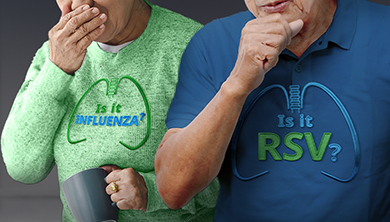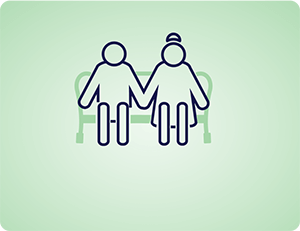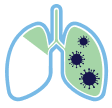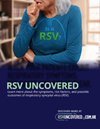

The cause behind respiratory tract symptoms might remain unknown.
Learn more about the risk of RSV in older adults.
About RSV
High risk adults & older adults
RSV can affect everyone, and could progress to severe outcomes & hospitalization in certain high risk groups2,4,5.
Groups at increased risk include2,5:
Preterm babies aged 6 months or younger5

Children with chronic conditions, aged less than two years5

Older adults(≥ 65 years of age)2

Those with an immunodeficiency2,5

Patients with certain chronic illnesses
Such as chronic heart or lung disease2,5

Learn more about RSV in infants.
Potential Outcomes for At-Risk Adults
Potential outcomes for older adults
Knowledge of RSV in Older Adults
LIKE INFLUENZA, RSV CAN RESULT IN SERIOUS OUTCOMES IN OLDER ADULTS2,7,8
IN ONE STUDY OF ADULTS 60 YEARS AND OLDER HOSPITALIZED WITH RSV, SERIOUS COMPLICATIONS OCCURED9
From a US-based observational study of adults ≥60 years hospitalized with RSV, approximately two-thirds were ≥75 years and >30% had ischemic heart disease, CHF, diabetes, or COPD/chronic bronchitis/emphysema. In this study†:

admitted to the ICU


Were readmitted within 30 days of discharge

RSV CAN LEAD TO SERIOUS PULMONARY COMPLICATIONS IN THOSE WITH CHRONIC CONDITIONS
Some older adults face a higher risk of RSV-associated morbidity and mortality11
CHRONIC HEART DISEASE, COPD, ASTHMA, AND OTHER SELECTED COMORBIDITIES ARE ALL RISK FACTORS FOR SEVERE RSV.11
IN A STUDY OF ADULT PATIENTS WITH CORE RISK FACTORS# FOR SEVERE RSV OR INFLUENZA11
RSV PATIENTS EXPERIENCED MORE COMPLICATIONS DURING HOSPITALIZATION, INCLUDING LOWER RESPIRATORY COMPLICATIONS, CARDIOVASCULAR COMPLICATIONS, AND BACTERIAL SUPERINFECTIONS, COMPARED TO PATIENTS WITH INFLUENZA11
Cardiovascular
complications

Bacterial
superinfections
UNDERSTAND THE BURDEN THAT RSV CAN BE

Stop the spread of RSV
You can2:
For more information on adult RSV infection, please visit the Centre of Health Protection website.
RSV Transmission
HOW WELL DO YOU KNOW RSV?
TEST YOUR KNOWLEDGE IN THIS QUIZ.
Who can get infected with RSV?
People of all ages, both healthy and with certain underlying conditions, are potentially susceptible to RSV.2,4,5
Correct!
The answer is yes.
Everyone can get infected with RSV.
In a US study of adults 60 years and older hospitalized with confirmed RSV, 18% were admitted to the ICU.9*
* In a US study of hospitalized adults 60 years and older who tested positive for RSV between Jan 1, 2011 and Jun 30, 2015, identified from Kaiser Permanente Southern California.
That’s right. Even more startling is that approximately 50% of adult patients also had confirmed pneumonia and 1 in 6 were readmitted within 30 days of discharge.9*
Actually, all of these statistics from this study of adults ≥60 years hospitalized for RSV are true. Even more startling is that approximately 50% of adult patients also had confirmed pneumonia and 1 in 6 were readmitted within 30 days of discharge.9*
WHAT IS RSV?
RSV, or respiratory syncytial virus, is a highly contagious virus. While most people experience mild symptoms that resolve on their own. RSV-associated acute respiratory infection can in some cases cause severe respiratory symptoms.1,2,5,12
RSV CAN BE EASILY MISTAKEN FOR INFLUENZA3
Like influenza, RSV is an RNA virus that is spread through close contact with infected individuals or contact with a contaminated surface. RSV incidence also tends to overlap with influenza season, typically occurring between late fall and early spring in the US.2,3
RSV ONLY AFFECTS THE UPPER RESPIRATORY TRACT.2
That’s right. RSV typically begins with common signs of upper respiratory tract infection but can progress to lower respiratory tract infection too.2,9
Sorry, that’s not accurate. RSV typically begins with common signs of upper respiratory tract infection but can progress to lower respiratory tract infection too.2,9
LEARN MORE ABOUT HOW RSV AFFECTS OLDER ADULTS.
